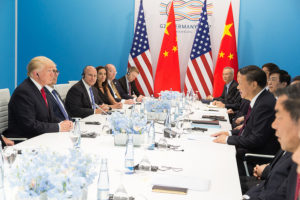
Yesterday, President Trump ordered his administration to consider tariffs on an additional $100 billion in Chinese imports on top of the $50 billion already implemented. The extra $100 billion is punishment for the $50 billion in tariffs China announced in response to the initial $50 billion the U.S. put on Chinese goods.
While many globalists, including some in Congress are wringing their hands over Trump’s tariffs, strong action against China is long overdue. China hasn’t played fair for decades. This is a single party system we are talking about, an economy that is far from the type of capitalism in the U.S. or even the euro-area.
There may be some short-term pain while the trade-war rhetoric ramps up as Trump pointed out this morning, but the long-run benefit of a better trade deal, far outweighs the near-term downside.
China has almost no leverage if this escalates to a trade war. The U.S. exports about $170 billion worth of goods and services to China. We import close to $500 billion of Chinese goods.
So let’s say China responds to Trump’s latest tariffs by slapping taxes on another $100 billion in U.S. goods and services for a total of $150 billion. That’s 90% of what we export to China. Trump could easily come back and hit China with tariffs on another $200 billion worth of goods.
How would China respond? There’s only $20 billion of goods and services left for China to tax. Isn’t that checkmate?
What about the trillion-plus dollars in U.S. Treasuries China owns, you might wonder? Couldn’t China dump U.S. Treasuries on the open market and drive up U.S. interest rates?
Yup, they could, but game out the likely impact. As soon as the market got word of China’s intention, a few things would happen. First Trump would probably threaten not to pay interest on the Treasuries China owned (even though that would likely never happen). Who would buy those Treasuries even if the prospect of non-payment was a remote possibility? Second, the yuan would soar, putting a much bigger dent in China’s economy than Trump’s tariffs. And third, the Fed would likely act to soak up the excess supply until the market could fully absorb it.
In all likelihood, what you are witnessing are negotiating tactics from Trump. They are unconventional in political quarters to be sure, but maybe not as stupid as some want you to believe.
Below are Trump’s comments on trade from an interview this morning via Bloomberg.
President Donald Trump said Friday the U.S. markets could face some “pain’’ from the trade standoff with China and other countries but claimed that Americans would be better off in the long-run due to his protectionist actions.
“I’m not saying there won’t be a little pain,” Trump said Friday during an interview on WABC Radio’s “Bernie & Sid in the Morning’’ program. “So we might lose a little of it but we’re going to have a much stronger country when we’re finished, and that’s what I’m all about.’’
Trump ordered his administration Thursday evening to consider tariffs on an additional $100 billion in Chinese imports, sending U.S. stock futures tumbling. In a statement Thursday, Trump cited “China’s unfair retaliation” in response to his list of proposed tariffs earlier this week covering $50 billion in Chinese products.



